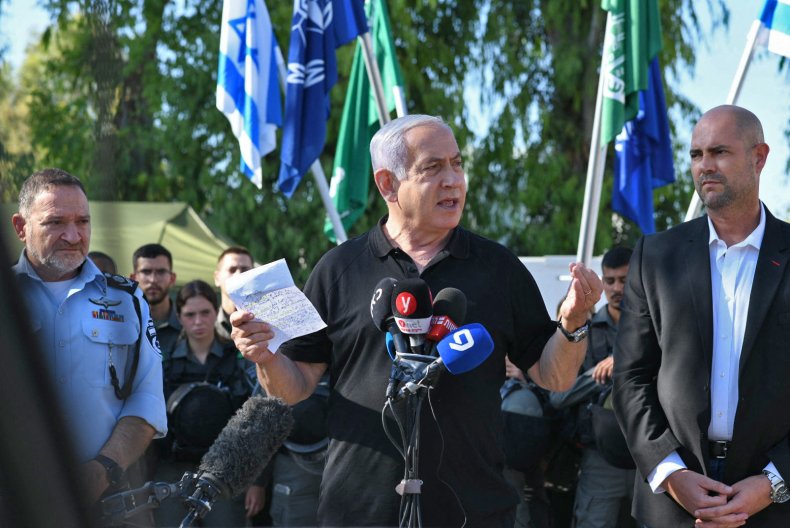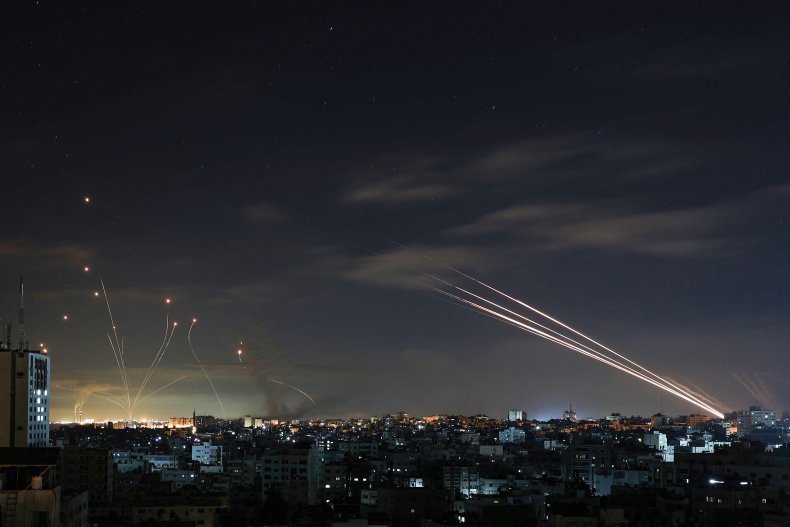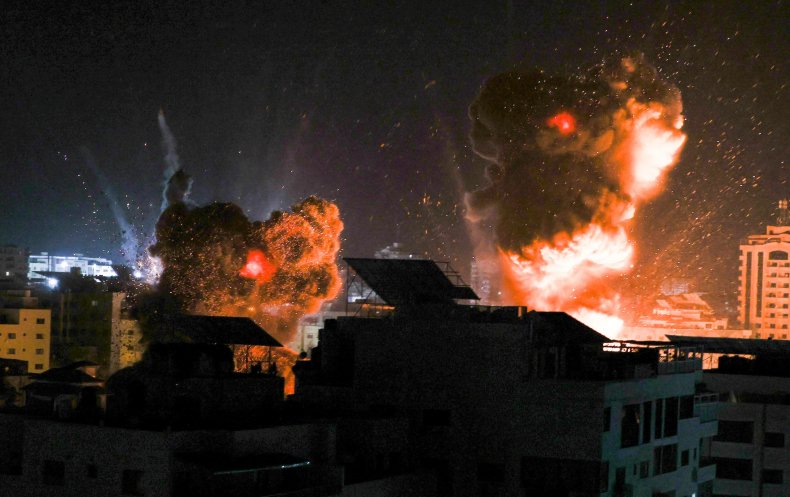Israelis and Palestinians See Election Schemes Fueling the Latest Gaza War
Both Israeli and Palestinian officials have identified what they view as ulterior motives on the part of rival leaders, whom they see as attempting to cling to or usurp power by fueling the current war being waged between the Israel Defense Forces and Palestinian factions operating out of the Gaza Strip.
The conflict, now in its second week, called "Operation Guardian of the Walls" by the IDF and "Operation Sword of Jerusalem" by a coalition of Palestinian forces led by the Hamas movement, has erupted into the worst conflagration between the two sides in years.
The intensity of the Israeli bombardment of infrastructure and people in the Gaza Strip, opposing a ceaseless volley of thousands of Palestinian rockets launched against Israel, are soon to reach unprecedented levels, if they have not already.
As devastating day-to-day developments consume the international news cycle, the origins of the current hostilities become further obscured.
A dispute involving Israeli families attempting to evict Palestinians from their homes in the Sheikh Jarrah neighborhood of Israel-occupied East Jerusalem stoked widespread tensions among rival communities. Israeli security forces stormed the Al-Aqsa Mosque, the third-holiest site in Islam, which sparked an international outcry and the first barrage of Hamas rockets.
Meanwhile, Israeli Prime Minister Benjamin Netanyahu faced what might be the biggest political crisis in his unmatched tenure, as foes sought to coalesce against him after a fourth failed attempt to form an Israeli government.
The emergency that evolved from the conflict complicated and distracted the focus on ending Netanyahu's 12-year stay in office. Those on the Palestinian side suspect the Israeli leader is exploiting the explosive battle to prolong his administration.
"It can be agreed that the Sheikh Jarrah issue came at the perfect moment for Benjamin Netanyahu," Palestine Liberation Organization Executive Committee Member Faisal Aranki told Newsweek, "as he continues to establish himself and remain in his position, interestingly after he failed in his efforts to formulate the new Israeli Government."
Aranki argued that Netanyahu will continue "to prove to the Israelis that he is the strongman that can control the chaos while also fearing rapprochement between the Palestinian Authority and the new U.S. Administration."
The Palestinian official saw no quick end to the Israel leader's antics.
"Netanyahu will continue to ignite the situation in Jerusalem to extend repercussions into the West Bank and to continue in the Gaza Strip," Aranki, who serves as head of the PLO's Department of Human Development, said.

Not only has the Israeli premier lost his Likud party's parliamentary majority over the past year, but he's also been put on trial for corruption charges in a judicial debate postponed due to a state of emergency declared due to the COVID-19 pandemic.
As the globally unmatched Israeli vaccination program—one that does not include jabs for millions of Palestinians with limited international representation—potentially prepares the country for a post-pandemic era, a new state of emergency has been declared for the Gaza war and the deadly sectarian unrest its spurred across Israel.
Suspicions of Netanyahu's motivations are not limited to the Palestinian officials. The man who appeared to have been poised to eventually succeed the Israeli leader has also aired his concerns.
Yair Lapid, a Knesset Member who leads the opposition as chief of the Yesh Artid party, has blamed the inability to form an official government for expanding woes now plaguing Israel in addition to the most serious conflict since the previous Gaza war in 2014.
The most ominous of these issues is the emergence of the worst hostilities between Israel's Arab community and far-right nationalists in decades.
In a statement published Saturday and shared with Newsweek by his office, Lapid lamented the impunity with which controversial figures such as far-right Otzma Yehudit party leader Itamar Ben Gvir were using the type of rhetoric that fuels domestic strife.
"If we had a government, security considerations wouldn't be mixed in with political ones," Lapid said. "No one would allow an extremist like Itamar Ben Gvir to set Jerusalem alight and then the rest of the country in its wake. No one would ask themselves why conflicts always seem to break out when it's most convenient for the Prime Minister. No one would hold endless press conferences instead of just doing their job."
Otzma Yehudit is part of the Likud-led bloc that would retain Netanyahu as prime minister. His support is key to Netanyahu's coalition maintaining the necessary number of seats for him to continue holding office.
Netanyahu himself has roundly rejected the notion that he was using the ongoing turmoil in Israel to extend his stay in office. Speaking to CBS News in an interview aired Sunday, Netanyahu called the theory "preposterous."
"I think anybody who knows me knows that I've never, ever subordinated security concerns, the life of our soldiers, the life of our citizens for political interests. That's just hogwash," Netanyahu said. "I'll do what I have to do to protect the lives of Israeli citizens and to restore peace. I've made peace with four Arab countries. I'm glad that we have a restoration of some considerable calm within Israel. That's my goal, to restore peace and quiet and to assure tranquility and reconciliation for all."
But the accusations have persisted, even drawing comparisons to former U.S. President Donald Trump's rallying of protests that ultimately led to the storming of the Capitol Building, resulting in several deaths. That event also drew international concern at a time when Trump refused to concede his electoral loss amid political—and potential legal—troubles.
Faced with this comparison, White House Press Secretary Jen Psaki declined to weigh in directly.
"It's not our role to assess or analyze the politics on the ground in Israel," Psaki told a press conference Monday. "Everybody has their own politics in different regions of the world, and we see that play out in foreign policy all the time."
Psaki said the U.S. role is "to be as constructive as possible in deescalating the violence, bringing an end to the conflict."
She noted the long history between Netanyahu and President Joe Biden, who served as vice president during the administration of former President Barack Obama, who took office shortly before Netanyahu in 2009.
"Our role is not to do political analysis or provide motivation for any actions," Psaki said, "but to take steps we can take as a leader in the world, as a country with deep relationships in the region to deescalate the violence on the ground."
So far, however, there is little sign of abatement in the bloodshed, and the debate as to what's truly behind the fighting continues to play out. As a chorus of voices scrutinizes Netanyahu's political aims, a number of Israeli officials point to a poisoned political atmosphere on the Palestinian side as well.
Palestinian National Authority President Mahmoud Abbas's own tenure predates the current one of Netanyahu—who previously served a non-consecutive term in the late 1990s—by three years. The 2006 Palestinian legislative election brought to power both Abbas and Hamas Political Bureau Chair Ismail Haniyeh, and it's the last vote held in the Palestinian territories since.
Hamas' strong showing in 2006 opened up a major schism among Palestinian factions, with Hamas and other Islamist organizations taking control of the Gaza Strip, and Abbas' left-wing Fatah party, which leads the Palestine Liberation Organization, retaining power in the West Bank. Multiple attempts to reconcile the rival sides have had limited success, and ongoing tensions led to a deep sense of uncertainty as Abbas scheduled elections for this year.
Then, as tensions mounted in Jerusalem late last month, Abbas postponed the vote, citing Israel's refusal to allow elections to be held in the disputed holy city. Hamas decried what it called "a coup," and Israeli Foreign Ministry spokesperson Lior Haiat said Hamas' subsequent attacks were tied to an opportunity to take advantage of frustration with Abbas' leadership.
"We were worried before the election that Hamas will take over Judea and Samaria or the Palestinian Authority, and that's exactly what Hamas is trying to do today," Haiat told reporters over the weekend. "This is the first conflict that we have with the Gaza Strip that has nothing to do with the Gaza Strip."
He said the motivation for the conflict on the Palestinian side is political.
"It has nothing to do with getting people out or in the Gaza strip or materials and goods in and of the Gaza Strip. Hamas is trying to take over the Palestinian Authority," Haiat said. "It's an internal political issue between Hamas and Fatah, and unfortunately, they're using Israel, in order to gain power in the internal Palestinian political frame."
He said that if Hamas ultimately succeeds in taking power, it would not only block any future Israeli-Palestinian negotiations, but also "put at risk the stability of other countries in the region."
One Israeli official told Newsweek last week that "Abbas was playing a very dangerous game" in his gamble to announce and then suspend the first Palestinian elections in 15 years.
"He's the one who, for a while, it was serving him to say that the election was postponed because Israel did not allow the election to take place in Jerusalem," the official said. "But now, it's actually turning against him, because when Hamas is doing what they do, it's putting Abbas in a very bad place that he doesn't want to be in, that he is again the weak part, that he cannot defend his own people and that Hamas is the one doing it."

A Hamas spokesperson recently told Newsweek that Israeli policies in Jerusalem were the catalyst for the ongoing flare-up.
"The reason for the demonstrations and the firing of the rockets is trying to deter the Israeli occupation and its settlers and extremist Knesset Members who insist to desecrate Al-Aqsa Mosque, which is the third holiest place for all Muslims around the world and the holiest site for us as the Palestinians," a Hamas spokesperson said. "In addition, to deter the Israeli authorities which have been working along with the settlers' organizations to expel the Palestinian families in Sheikh Jarrah from their homes and replace them with settlers."
As for the demands of the Hamas-led Palestinian coalition, they include "giving free access to worshipers from all parts of Palestine to pray at Al Aqsa Mosque without restriction or harassment by the Israeli police or the Israeli settlers and halting the attempts to expel the Palestinian residents of Sheikh Jarrah," the Hamas spokesperson told Newsweek.
Hamas officials have also hailed a growing spate of attacks conducted by Palestinians in the West Bank and Jerusalem against Israeli security forces, claiming this was an indication of pan-Palestinian support for the conflict.
Aranki, for his part, denies any political games on behalf of the Palestinian National Authority in the president's decision to delay the election.
"The postponement of elections was due to a strategic political position brought on by Israel's refusal to include East Jerusalem, which continues to be within the 1967 Occupied Territories, in the elections," Aranki said.
The Palestinian official also expressed frustrations with Hamas' rocket campaign, which he said "brought them back to the forefront of the event, while also pulling the rug from underneath the feet of those that initiated the event in Jerusalem and the ones that transferred the event into the 1948 regions-igniting participation in that region for the first time."
Still, Ankari reiterated the role that Netanyahu's actions in pursuit of his own interests played in stoking the current confrontation.
"Benjamin Netanyahu chose the escalation against the Palestinians in Jerusalem and Al-Aqsa, and the war on Gaza Strip," Aranki said, "in order to export his internal crises of corruption charges and his failed attempt to formulate a government to continue to create a state of emergency that would enable him to remain in the prime ministerial chair."
"This in turn," he added, "thwarts the camp opposing him from forming any alternative government, and seeks to use the time to go into a fifth election."
Both Israel and successive U.S. administrations struggling to deal with the Israeli-Palestinian conflict have often referred to Israel as "the only democracy in the Middle East," a phrase already subject to debate among international scholars.
Israel's latest struggle to form a governing coalition has disturbed even those within the country who specialize in analyzing the country's democratic institutions.
"The past two and a half years have undoubtedly posed serious challenges to Israel's democracy," Yohanan Plesner, president of the Israel Democracy Institute, told Newsweek. "The ongoing political crisis, which has resulted in a transitional government in place, has had serious repercussions. It has left senior cabinet posts and civil service positions such as the Police Chief unfilled, put long-term policy planning on hold, and left Israel without an approved budget in the midst of one of the worst health and economic crises in its history."
This vacuum, he argued, was the result of sabotage that has also left security gaps in a country known for its fixation on self-defense, and it has done so at a critical juncture in its history.
"We have seen efforts by a number of political leaders to weaken the rule of law," Plesner, who previously served for several years as a Knesset member in the Kadima party, said. "Among other factors, the chaos and violence we are witnessing in many Israeli cities is the result of a police that has been weakened as part of these efforts to sow doubt about law enforcement officials."
"This is all in addition," he added, "to the inherent weakness of the Israeli political system that doesn't provide the majority with the tools to stand in the way of powerful minority interest groups."
Plesner also noted that "it was Hamas' instigation that initiated the current escalation," and he saw a tie-in between the strife oversaturating Israel with Netanyahu's personal ambitions, saying "nevertheless it has served Mr. Netanyahu politically."
"Previously, he was days away from losing the premiership—and now the political cards have been reshuffled to his advantage," Plesner said. "Israel has been in a state of political crisis for more than two years, with the Prime Minister on trial coupled with a devastating pandemic. The endless election cycles (four in less than two years) are the result of both systematic failures as well as Mr. Netanyahu's refusal to accept any reality that doesn't include a halt to his trial."
But this "rally around the flag" effect, as Plesner calls it, "could diminish over time if the fighting drags on without the prospect of a clear victory."

From a tactical perspective, the IDF has a near-insurmountable advantage in terms of technology, firepower and logistics. Israeli officials tout a roughly 90% interception rate for the Iron Dome defense system, as Hamas and Palestinian Islamic Jihad have fired more than 3,700 rockets, hundreds of which the IDF says fell short within the Gaza Strip itself, adding to the number of Palestinian casualties.
The Gaza-based Ministry of Health says 213 Palestinians, including 61 children, 36 women and 16 elderly people, have been killed so far. The IDF says it has killed at least 130 enemy combatants, and counts 12 casualties in Israel, all but one of them civilians.
Meanwhile, as scenes of devastation capture global attention and the war extends into its second week, international calls for a ceasefire are mounting. The United Nations Security Council has sought to release language emphasizing a cessation of hostilities, but the U.S. has so far blocked it, leaving the vote to the U.N. General Assembly, where such an effort is expected to pass.
Meanwhile, the Biden administration's language has evolved. In his third call with Netanyahu since the conflict blew up last week, Biden for the first time "expressed his support for a ceasefire" alongside regional efforts the U.S. has been pursuing with regional nations, particularly Egypt, an influential player that borders the Gaza Strip.
But as rockets continue to fly through the skies of Israel and the IDF continues a comprehensive campaign of strikes against its foes in the Gaza Strip, Netanyahu and the armed forces he commands vow to press on with the battle.
"The topic of any de-escalation is obviously not on the table," IDF spokesperson Lieutenant Colonel Jonathan Conricus told reporters Tuesday, "and we continue to operate and to prepare for various scenarios."

